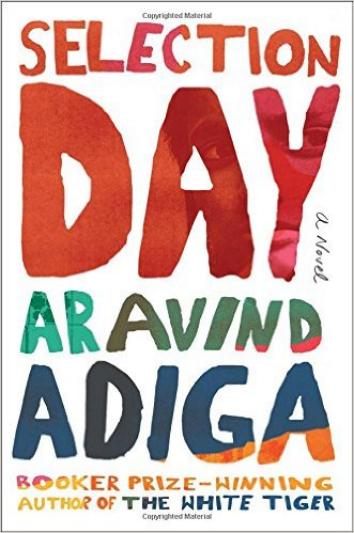
Slate is an Amazon affiliate and may receive a commission from purchases you make through our links.
Some Boys Rise, Some Boys Fall
A Mumbai father dreams of cricket superstardom for his two sons in Aravind Adiga’s Selection Day.

Maddie Edgar
“What we Indians want in literature,” announces one of the characters in Aravind Adiga’s novel Selection Day, “is not literature at all, but flattery. We want to see ourselves depicted as soulful, sensitive, profound, valorous, wounded, tolerant and funny beings. All that Jhumpa Lahiri stuff.”
Adiga doesn’t write “that Jhumpa Lahiri stuff.” Instead, he seems to agree with that character that Indians are “animals of the jungle, who will eat our neighbor’s children in five minutes and our own in ten.” It’s a characterization that harkens back to the title of Adiga’s debut, The White Tiger, winner of the 2008 Booker Prize, which raised hackles in his homeland by depicting contemporary India as a near-Hobbesian competition for success. White Tiger is narrated by a taxi-service owner who claws his way to affluence by means that include homicide and theft.
Corruption is just as commonplace in Selection Day, as well as a craven deference to any form of celebrity. At one point, Manju Kumar, the hero of Selection Day, a teenage boy raised in a Mumbai slum, marches up to a hospital and demands entrance to the morgue. “Only doctors, interns, or medical students are let in,” the guard tells him. “But I play cricket,” Manju replies. He gets in.
The Indian worship of cricket provides the backdrop to this novel, which takes its title from an exhibition in which young players are chosen to advance to the professional level. Manju and his older brother, Radha, have been raised from an early age to ascend to that nirvana. Their father, Mohan, a small-time chutney salesman, abandoned his mountain village for the sole purpose of raising two Mumbai cricket stars. As stage parents go, he makes Mama Rose in Gypsy seem laid-back. He forbids his sons fried carbohydrates and sugar and subjects them to merciless training routines and intrusive physical examinations. He regards “premature shaving, pornography, and car driving” as “the three principal dangers on their path to glory,” and he stifles Manju’s interest in science. (A big CSI fan, the boy dreams of becoming a forensic pathologist, which explains his visit to the morgue.) Mohan’s sons are devoted to each other but can’t stand him, yet their plans to escape his tyranny never extend to envisioning an alternative to cricket itself.
Many novelists are called Dickensian, but Adiga comes closer than most, albeit with every last speck of Victorian sentimentality suctioned out. His characters are brightly and sharply drawn and animated with great energy; reading about his Mumbai is like taking a double shot of espresso. In addition to the Kumars, there’s Tommy Sir, a coach who longs to “solve this mystery of mysteries and find a great, I mean great batsman.” A melancholy figure who paints tragic subjects and putters away on a military history, Tommy Sir writes a syndicated newspaper column called “Some Boys Rise, Some Boys Fall: Legends of Bombay Cricket and My Role in Shaping Them.” The sport’s recently contaminated history of fixing scandals makes him weepy: “How did this thing, our shield and chivalry, our Roncesvalles and Excalibur, go over to the other side, and become part of the great nastiness?”
You need not know anything about cricket in any of its variations to savor Selection Day. In fact, you don’t need to have any interest in sports at all. Cricket serves Adiga as a marvelously flexible metaphor: for the (lost) dream of civic integrity, for tradition and authority, for the contest that is life in a rapidly evolving economy. Mohan believes that his sons owe their talent and their future success to a pact he made with a god; part of the deal is that Radha will become the best batsman in the world and Manju the second best. But when the younger brother pulls ahead, the divinely ordained plan that binds this dysfunctional family together begins to unravel.
To get ahead, the Kumars must also negotiate an assortment of upper-middle-class gatekeepers of greater and (mostly) lesser degrees of sensitivity. A slick international character, Anand Mehta, invests in their athletic careers early on. The scion of a long line of stockbrokers, Mehta views himself as an entrepreneurial visionary and has jettisoned familial expectations for more exciting late-capitalist alternatives like brand management. Adiga is particularly adept at skewering this breed of affluent, globalized Indian; the Nietzsche-reading Mehta takes pride in the years he spent studying business in New York, “that meritocratic metropolis,” where Indian immigrants stand out for being “driven, Anglophone, numerate, and freed by postcolonial entitlement from almost all forms of liberal guilt or introspection.” He considers the affair he had with a black woman there to be a notable badge of his sophistication. It annoys him that no one, especially his family, recognizes the sacrifice he made in coming back to Mumbai. In a recurring daydream, Mehta imagines being told that he could save only one city in the world from a nuclear war and picking Mumbai—then flying to New York to die with everyone there.
The Kumar boys, whose mother vanished years earlier under ambiguous circumstances, have one female friend and intermittent love interest, a wealthy girl who prattles in social-justice clichés while exhibiting what Manju recognizes as an upper-class “carelessness in probing the personal life of one not of her class.” It’s the same cavalier attitude shown by Javed, the son of a rich Muslim family, and the boy with whom Manju ever so slowly falls in love. Javed writes poetry, reads George Orwell, hangs out with a “gang” (more a band of rowdies than a criminal enterprise), and, most shocking of all, could not care less about cricket, despite having plenty of innate talent. He accuses Manju of being a “slave”—to his father, to the game, to convention. The little flame of tenderness that flares up between the boys is one of the few lovely things in a world dominated by a thrilling but ugly vitality, but daring Javed, of course, has no grasp of what it’s like to live as the Kumars do, balanced on the edge of a precipice.
Class is Adiga’s great theme, and his depiction of its workings in India ranges from the fondly comical to the savage. The slum where the Kumar brothers grow up has a cardboard arch reading “Welcome to Our Home” over its entrance, bestowed on the neighborhood by a political party and decorated with the “beaming, disembodied faces of city, statewide, and national leaders, at least two of whom were serving jail sentences, a fact which only heightened the impression that they were so many medieval criminals whose grinning heads had been hoisted up above a city gate.” Their father (whose motto is “Big thief walks free. Small thief gets caught”) warns the boys that if they fail at cricket all three of them will end up begging outside the train station. The peril of backsliding haunts them, a specter embodied by a drunk Mohan sees slinking out of a bar, “a senile creature, pale and trembling, every known species of broken Indian male.” The “male” in that sentence is significant. Women in this novel are elusive and daughters a luxury reserved for the rich. As Mehta explains it, the nation is missing “about ten million women,” due to “decades of selective abortion.” The imbalance, he predicts, is making India’s young men more and more “deranged.” The only cure for that derangement, he insists, is cricket, but by the end of this ferociously brilliant novel, it’s obvious that exactly the opposite is also true. Cricket, for all its tattered beauty, is the emblem of both everything that makes Mumbai great and everything that’s driving it mad.
---
Selection Day by Aravind Adiga. Scribner.
Read the rest of the pieces in the Slate Book Review.
Selection Day: A Novel
Check out this great listen on Audible.com. From Aravind Adiga, the best-selling, Booker Prize-winning author of The White Tiger, a dazzling new novel about two brothers in a Mumbai slum who are raised by their obsessive father to become cricket stars and whose coming of age threatens their relat...

